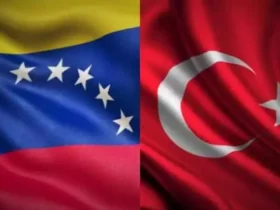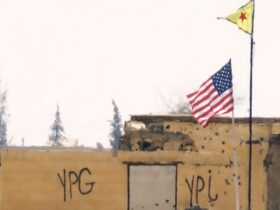The public agenda in Turkey this week included EU interference with a Turkish aid ship in the Eastern Mediterranean and the announcement of COVID-19 cases by the Health Ministry.
THE UNLAWFUL INTERVENTION AND SEARCH ON THE TURKISH AID SHIP BY GERMANY AND GREECE
On November 22, German commandos under the tactical command of a Greek Commodore, part of the EU-led Operation Irini, interrogated the Turkish container vessel MV Roseline, 100 miles off the Libyan Coast. The officers and crew were detained by force and the ship was searched and held until the next morning.
Turkish President Recep Tayyip Erdogan blamed Greece and Southern Cyprus for the inspection of the Turkish vessel on behalf of a European Union mission to implement an arms embargo on Libya.
“Despite the provocations by Greece and South Cyprus on the eastern Mediterranean issue, we have reacted with patience and restraint,” Erdogan said when speaking to deputies of his party.
“However, despite our patient and restrained attitude, they recently raided our freighter that was transporting cargo to Libya. This was not in line with the international law of the sea… Once again, the captain of the ship that conducted the operation was a Greek national. When they boarded the ship, they harassed the crew,” he added.
The Turkish Deputy Foreign Minister Onal summoned the ambassadors of the EU and Italy as well as the German charge d’affaires (as the ambassador is currently away) said in a ministry statement. Turkey gave them a diplomatic note on Sunday which said: “the incident is against international law and our rights to compensation are reserved.”
The ministry earlier said the Turkish vessel was only carrying paint, paint materials, and humanitarian aid to Libya’s port of Misrata.
Turkey will take measures in response to the unlawful search of the ship, said the retired senior Turkish Admiral Deniz Kutluk.
Kutluk argued that “Germany wants to give a message to Turkey on the one hand and appease Greece on the other hand prior to the upcoming EU leaders summit.”
“Searching a ship requires the flag state’s permission. In this case, the ship was not in the open seas adjacent to Libya’s territorial wars, it was 200 kilometers away from that area. Though approval from Libya’s government was needed as well, it was not sought,” Kutluk added.
Reiterating that Greece is also responsible for the illegal search, he said: “After what happened, a Greek ship sailing anywhere in the world could be searched by a Turkish warship. International law would recognize this. It gives the right to reprisal, retaliating against those who violated legal norms.”
Retired Turkish Rear Admiral Cem Gurdeniz, now a UWI author, also evaluated the consequences of the unlawful intervention under 6 simple titles:
1. This was clear interference of the freedom of navigation and a violation of Turkey’s sovereignty. The incident will heighten distrust between Turkey and European Union.
2. The incident will also harm NATO solidarity, given that the Tactical Commander and the Operational Commander who authorized the operation belonged to NATO states. Where is the trust and solidarity?
3. It distorted the very basis of freedom of navigation through forceful boarding and searching of a defenseless merchant ship.
4. In the minds of the Turkish people, the effect of this hostility will be similar to the American assault against Turkish Special Forces at Iraq/Sulaymaniyah on July 4, 2003.
5. This will also open the way and set examples for conducting bogus interventions and boarding’s for other players in the oceans. The EU has essentially opened the Pandora’s Box.
While this intervention does not entail “obtaining profits”, it is done for “private gains” for Germany and EU, with the instigation and manipulation of a Greek commodore. It is, in this regard, akin to a modern form of piracy. This shall have negative and disturbing effects over the Eastern Mediterranean and Aegean disputes, destroying mutual trust, good faith and confidence among the related parties. We might recall that Turkey cancelled the July 21 NAVTEX at the request of German Chancellor. However, the Greek side has exploited the cancellation, concluding a so-called delimitation agreement with Egypt. This undermined Germany’s umpireship and good office status. Now Turkey has taken a second blow from Germany.
The German Foreign Ministry spokesperson Andrea Sasse said that Germany has “made it clear that we feel that Turkey’s behavior is problematic in many ways. We raise this regularly in Turkey.”
“We must reiterate that we have taken a position on Turkey’s behavior many times,” Sasse said when asked about a possible reaction from Germany. “Overall, Turkey’s behavior is on the agenda of the December European Council.”
NATIONWIDE LOCKDOWNS AND THE ACTUAL NUMBER OF COVID CASES
Following a meeting of the Coronavirus Scientific Advisory Board, a partial lockdown was initiated entailing the lockdown of all cafes, restaurants and other services, allowing take-away and delivery services only. Supermarkets and other stores will now only be open until 8 pm.
According to the new regulations, a partial lockdown between 9 pm in the evening and 5 am in the morning for the weekdays, and a total lockdown for the weekends will be in place.
Health Minister Fahrettin Koca said the number of asymptomatic cases will also be shared from Wednesday.
And after that Turkey registered 28,351 more coronavirus infections, including 6,814 symptomatic cases, over the past 24 hours, according to Health Ministry data released on Wednesday.
The total number of symptomatic cases in the country reached 467,730.
Turkey saw 168 fatalities over the past 24 hours, the highest single-day spike in the country, bringing the death toll to 12,840.
Around 164,547 COVID-19 tests were done across the country, bringing the total to date to over 17.73 million.
The number of patients in critical condition now stands at 4,641.
The health minister said he was hopeful that Turkey would have a COVID-19 vaccine before the end of the year.
“If all goes well, we plan to start vaccinating at-risk groups gradually, starting with our healthcare personnel,” he said, adding that people will be vaccinated for free.
Turkey has already concluded a deal for 50 million doses of China’s Sinovac vaccine that will be delivered in December, January, and February, according to the ministry.

















Leave a Reply